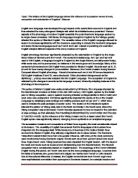Has England Lost Its Identity? By Mark D Higgins
LONDON -- The English, The English, the past masters of the empire and united kingdom are now suddenly being looked down upon and left out of decisions in their own land. In the last year, the three other regions that make up Britain -- Scotland, Wales and Northern Ireland -- have been putting in place new legislatures to deal with parochial affairs no longer considered the preserve of the British Parliament in London. Some in England, traditionally the ruling power in the kingdom, are now thinking that maybe it should have one too. The country that created the world's primary language and was once the seat of empire, England still accounts for 83 percent of the British population and 85 percent of the economy, but its history with the snub means it knows one when it sees one. The parcelling out of authority to the remoter parts of the United Kingdom has left English traditionalists, a dwindling species themselves, anxious about a lot more than not having their own local lawmakers with a taste for tartans and kilts. Some of the English have even started sulking in what seems to be obvious as an identity crisis. Their frontier passions were stirred by Conservative leader William Hague at the party's annual conference a few years ago in Bournemouth, Hague gave prominence to a proposal to establish a separate assembly for England as one of the steps that the Tories ought to consider to counter the dominance of the governing Labour Party. The new legislatures are being organised in Scotland, Wales and Northern Ireland under Prime Minister Tony Blair's "devolution" project of setting up regional authorities for strictly local matters while the British Parliament keeps its powers over broad national policy concerns. During almost three centuries of union, the Irish, the Scots and the Welsh kept their distinct national personalities alive and have a ready supply of symbols to light patriotic fires. The English, by contrast, may have let their singular identity become extinguished within Britain. The so-called Celtic fringe has myths, songs, food, dress and verse that speak to a robust sense of nationhood. The English, in need of talismans to raise the blood, find themselves stuck with the same old stereotypes: stiff upper lip, tepid ale, cool heads and cricket greens. Counselled to portray themselves as British instead of English, the traditionalists are now caught up in flag-waving nationalism, using the union flag as an image of Britain and England, while the other parts of the united kingdom had always kept their local identity as primary. The keenest sense of nationalism the English feel is not to their nation, but to their land, and not to the land they inhabit today but to some mythical image of a great empire in which they are centre of. It is not the country in which the English actually live, but the place they imagine themselves living in. The English have become exiles from their own country in the way that without Britain they have no individual identity. We once had a sure sense of who we were, we were polite, unexcitable, reserved and had hot water bottles instead of a sex life. Asked to define their country, Englishmen become anecdotal and sentimental. Unable to settle on an absolute virtue, they end up cataloguing England's charms. For example when John major said that England for him was "long shadows on county grounds, warm beer, invincible green suburbs and Cricket”. Products of an island culture and tempered by the Reformation, the English have liked to think they stood for a belief in individual liberty, respect for eccentricity, a bloody-minded devotion to privacy and, above all, a sense of honour. Unfortunately for us, the best-known expression of English nationalism these days is the behaviour of our football fans, who are notorious abroad for drunkenly rampaging through town centres, tearing up stadiums and beating up opposing teams' fans. Significantly, the war paint they cover their faces with no longer form the Union Jack of Britain but the red and white cross of St. George that stands for England. Maybe this is because the English football team is one of the only things which never became in union and so therefore was the only piece of unique identity we had left. An Englishman today is more likely to have a tattoo on his arm than a bowler hat on his head, in that way the English for too long considered themselves British. (As they generally thought the two were the same as England was dominant in the union). But now without the title of British, The English have realised that they are not the reserved nation of the past but a completely different, more “loud” nation. The country's most famous diplomats are not the ones at global conferences in striped pants and a stiff upper lip, but the footballers on the pitch and the popstars in miniskirts. For all its reputation for snobbery and exclusiveness, however, England has been the most welcoming part of Britain to immigrants and has a more ethnically diverse culture than any of the other parts of the United Kingdom. Also maybe because Britain’s empire spreaded its unique qualities all over the place, now, without an empire England finds itself no different from the places the seed of Britain spread to.







